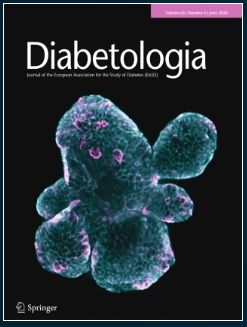糖尿病前期最重要的研究问题是什么?与患者、保健专业人员和研究人员合作,确定优先事项的伙伴关系。
IF 10.2
1区 医学
Q1 ENDOCRINOLOGY & METABOLISM
引用次数: 0
摘要
研究议程通常由研究人员和资助者设定,这意味着最终用户(如患者和医疗保健专业人员(HCPs))的优先事项可能在研究中被遗漏或忽视。为了确保未来的前驱糖尿病研究对前驱糖尿病患者和HCPs患者有益,重要的是让这些利益相关者参与制定研究议程。本研究的目的是通过与患者、亲属、患者组织、HCPs和研究人员的参与和合作,建立糖尿病前期(HbA1c 42-47 mmol/mol[6.0-6.4%])最重要的10个研究问题列表。方法采用改进的James Lind联盟优先级设定伙伴关系方法,遵循以下四步流程:(1)收集不确定性;(2)组织不确定性;(3)中期优先事项的确定;(4)车间最终优先级设置。此外,还评估了最后的前10名名单的国际相关性。结果共有405人提交了1142份问卷,问卷的主题是:“您希望看到关于糖尿病前期的哪些问题得到研究的回答?”收集到的不确定因素被分类并浓缩为35个指示性问题。通过优先排序,患者和家属对研究人员和医务人员有不同的偏好。共同商定的十大问题包括预防策略、风险因素、饮食建议、筛查和个性化治疗。最重要的是:“什么是最好的糖尿病预防,早期预防策略是否会减少2型糖尿病患者的数量?”结论/解释:糖尿病前期患者、HCPs和相关利益相关者之间通过反复协作的过程确定了共同的优先事项。研究结果应支持学术界、资助者和医疗保健行业针对糖尿病前期患者和医疗服务提供者的需求进行针对性研究。本文章由计算机程序翻译,如有差异,请以英文原文为准。
What are the most important research questions within prediabetes? A priority setting partnership in collaboration with patients, healthcare professionals and researchers.
AIMS/HYPOTHESIS
Research agendas are typically set by researchers and funders, meaning that priorities of end users, such as patients and healthcare professionals (HCPs), could be missed or overlooked in research. To ensure future research in prediabetes is of relevance and benefit to people with prediabetes and HCPs, it is important to involve these stakeholders in setting the research agenda. The aim of this study was to establish a top-10 list of the most important research questions in prediabetes (HbA1c 42-47 mmol/mol [6.0-6.4%]) by involving and collaborating with patients, relatives, patient organisations, HCPs and researchers.
METHODS
We used a modified James Lind Alliance Priority Setting Partnership methodology, following the four-step process including: (1) Gathering uncertainties; (2) Organising uncertainties; (3) Interim priority setting; and (4) Final priority setting in a workshop. Further, the international relevance of the final top-10 list was assessed.
RESULTS
A total of 1142 responses were submitted by 405 people to: 'What questions about prediabetes would you like to see answered by research?'. The collected uncertainties were categorised and condensed into 35 indicative questions. Through prioritisation, patients and relatives had different preferences from researchers and HCPs. The jointly agreed top-10 list included questions on prevention strategies, risk factors, diet advice, screening and personalised treatment. Highest prioritisation was given to: 'What is the best prevention of diabetes and will early prevention strategies reduce the number of people with type 2 diabetes?'.
CONCLUSIONS/INTERPRETATION
An iterative and collaborative process identified shared priorities between patients, HCPs and relevant stakeholders in prediabetes. Findings should support academia, funders and the healthcare industry to target research within prediabetes specifically to the needs of patients and HCPs.
求助全文
通过发布文献求助,成功后即可免费获取论文全文。
去求助
来源期刊

Diabetologia
医学-内分泌学与代谢
CiteScore
18.10
自引率
2.40%
发文量
193
审稿时长
1 months
期刊介绍:
Diabetologia, the authoritative journal dedicated to diabetes research, holds high visibility through society membership, libraries, and social media. As the official journal of the European Association for the Study of Diabetes, it is ranked in the top quartile of the 2019 JCR Impact Factors in the Endocrinology & Metabolism category. The journal boasts dedicated and expert editorial teams committed to supporting authors throughout the peer review process.
 求助内容:
求助内容: 应助结果提醒方式:
应助结果提醒方式:


